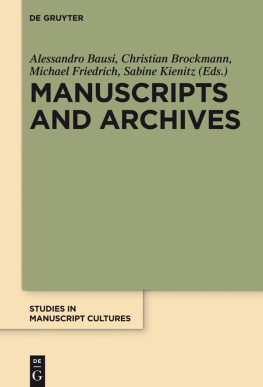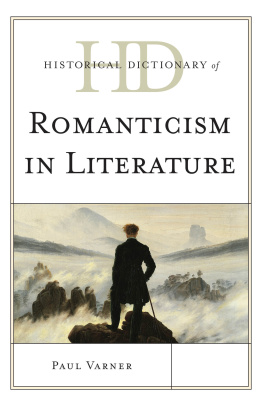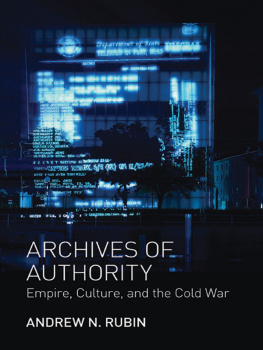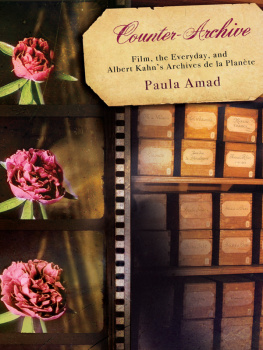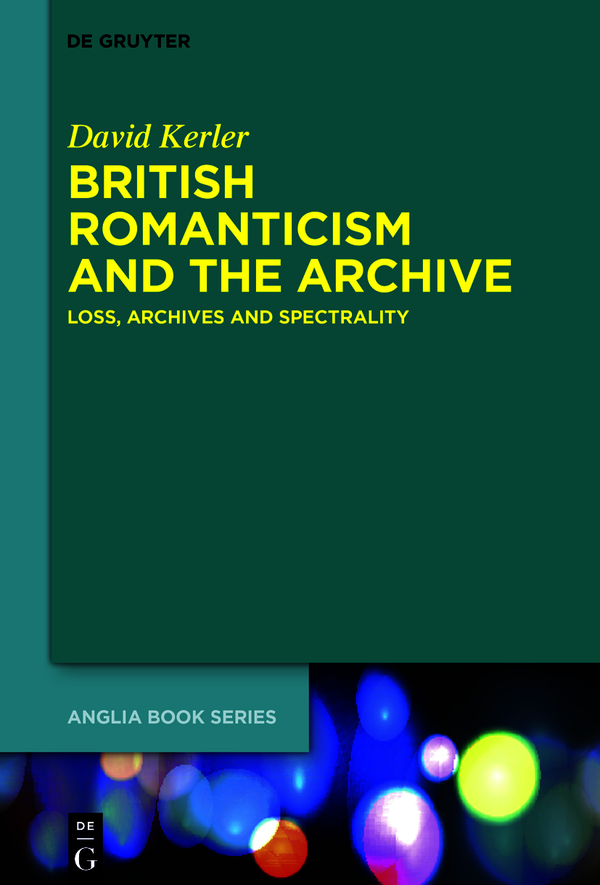Buchreihe der Anglia / Anglia Book Series
Edited by
Andrew James Johnston
Ursula Lenker
Martin Middeke
Gabriele Rippl
Daniel Stein
Volume
ISBN 9783110775501
e-ISBN (PDF) 9783110775556
e-ISBN (EPUB) 9783110775624
Bibliographic information published by the Deutsche Nationalbibliothek
The Deutsche Nationalbibliothek lists this publication in the Deutsche Nationalbibliografie; detailed bibliographic data are available on the Internet at http://dnb.dnb.de.
2022 Walter de Gruyter GmbH, Berlin/Boston
For Julia, Vincent and Olivia
I Introduction
Note: Parts and ideas of this chapter (ch. I) were previously published by De Gruyter: ): 355383.
The present book takes its cue from a rather marginal yet fundamentally significant note in Jacques Derridas Archive Fever. Reflecting on Sigmund Freuds psychoanalysis, or on the archivization of psychoanalysis itself (: 1617), Derrida asks whether
the psychic apparatus [is] better represented or is it affected differently by all the technical mechanisms for archivization and for reproduction, for prostheses of so-called live memory, for simulacrums of living things which already are, and will increasingly be, more refined, complicated, powerful than the mystic pad (microcomputing, electronization computerization, etc.)?
(: 16)
The crucial observation made by Derrida in this passage attributes a significant influence to the media-technical materiality of archives, i.e. not only does it affect the archival structure of objects, their de- and recontextualisation, but also how we (discursively) apprehend and thus co-construct those very objects. [T]he archive, as printing, writing, prosthesis, or hypomnesic technique in general, Derrida contends, is not only the place for stocking and for conserving an archivable content of the past [] [n]o, the technical structure of the archiving archive also determines the structure of the archivable content even in its very coming into existence and in its relationship to the future (1995: 17); [t]here is no archive [] without a technique of repetition, and without a certain exteriority (1995: 14). What influence, then, has the archive on the culturalaesthetic output of a historical period that is characterised by rapid technological developments which catalysed the construction of numerous (new) archives and archival practices? And how does the archives (de)constructive structure the conflation of storage and effacement, of presence and absence, to which Derrida refers ambivalently with his concept of the troubled archive, le mal darchive affect those literary-aesthetic archival practices and discourses?
Long before the digital age with its alleged : 4). As Walter J. Ong points out, this transition from orality to print coincides precisely with the turn of the Romantic period:
The Romantic Movement marked by the beginning of the end of rhetoric as a major academic and cultural force in the West. The Romantic Age took form with the maturing of knowledge storage and retrieval processes made possible by print. These processes had produced a store of readily retrievable knowledge greater than had ever before been possible. Print had effectively reduced sound to surface, hearing to vision. Despite the fact that it was verbally constituted and ultimately tied to the oral world, the store of knowledge accumulated in print was no longer managed by repetitive, oral techniques, but by visual means, through print, tables of contents, and indices. Knowledge was tied not to spoken words but to texts. This separated the knowledge from the lived world.
(: 296297)
The new age of paper (: 238239).
Given the extensive construction of the archives referred to, however, it appears paradoxical that these developments were to coincide with an increasing awareness of loss. The latter appears, especially (but not exclusively) within the context of the periods print culture, for example, in (1) an uncontrollable proliferation of archives, i.e. an incommensurability arising from the sheer amount of documents/objects, and/or (2) an anxiety regarding their precarious materiality (such as decaying paper or fading colours). : 144) notes in this regard, [a]lthough the Romantics were not the first, nor we the last, to understand that archives are or can be fragile, the precarity of their era sharpened the odds that one could lose what one had hoped to preserve.
Against this backdrop, I can now further specify the books argument. Taking my starting point from the Derridean notion of le mal darchive, I seek to explore the complex interrelations between the experience of loss, the phenomenon of melancholia, the archive and their (self)destructive tendencies, surfacing in different forms of spectrality, in selected poetry from the late-18th to the mid-19th century. It will be argued that the British Romantics were highly influenced by the periods archival fever manifesting itself in various historical, material, technological and cultural aspects and (implicitly) reflected and engaged with these discourses and materialities/medialities in their works. These comprise (discursive traces in) aspects such as themes/motifs, aesthetics, archival ideologies and metapoetical issues that deal with genre and language as archiving media, and the very materiality of the poems, i.e. the materiality of sound, print and writing. At the centre of my theoretical considerations and literary analyses is the paradoxical double movement of the archive, which Derrida hints at through the ambivalence of the original French title of his essay, le mal darchive (1995): Read as suffering from archive fever (see, for example, 2000: 658663), arising from the archived objects presence within its absence.
Within the framework of this new theoretical and material/cultural perspective, the study aims to recontextualise and shed light on both the historical-cultural developments outlined as well as the literary aesthetic features of the Romantic period. By tracing the material and discursive influences of archives/archival processes in paradigmatic Romantic poems, details and coherence previously gone unnoticed shall be laid bare, ultimately contributing to a new and more profound understanding of these texts and British Romanticism(s). It will be shown that the various discursive and material manifestations of archives and archival practices comprising the feverish, at times melancholic, desire to archive as well as the archives (de)constructive structure not only echo the periods technologicalcultural and historical developments along with its incisive experiencing of loss, but also fundamentally determine Romantic subjectivity and aesthetics. In so doing, the Romantics archive fever poses a challenge to what Jerome ) has labelled the romantic ideology, (self-critically) exposing the profound embeddedness of Romanticism within the materialhistorical realities of its time.
In recent years, the (historical) description and analysis of archives, their characteristics and functions as well as the very concept of the archive, have flourished as an object of study in the humanities. As a result of numerous interdisciplinary approaches together with the application of their respective methods and specialisations, the scope of the concept differs widely. The historian Markus
Despite recent scholarly interest in archives, there are almost no larger studies that further differentiate and operationalise Derridas concept of


